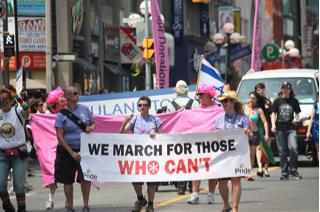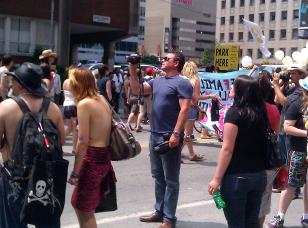
Dyke March 2011. Credit: Marcus McCann
While Toronto Councillor Giorgio Mammoliti steamrolls ahead in his mission to axe Pride Toronto (PT) funding in the name of protecting the Jewish community from hate speech, Jewish leaders are taking a big step back.
“He just doesn’t get it,” says Bernie Farber, who has taken a leave of absence from the Canadian Jewish Congress (CJC) to run in the upcoming provincial election.
Farber says the CJC’s position is clear: the case against Queers Against Israeli Apartheid (QuAIA) and Pride Toronto is closed.
“When all this started with QuAIA, the focus was always on the Pride parade,” he says. “There was no overt action taken by QuAIA at the parade this year… Look, it’s time to move on. The commitments that were made were carried out.”
During Pride weekend, Mammoliti took his video camera to the July 2 Dyke March in a stated effort to capture marchers “using hate speech against Israel.” In his 17-minute video, one suspect sign reads, “Standing with queers in Palestine.” For Mammoliti, it’s the same political message.
“We should all be standing in solidarity with queers in Palestine because they don’t have a great life there,” Farber says. “We should be speaking out on their behalf. Mr Mammoliti is confused. Most of us kind of get this. It was always about the parade, and the parade went off without a hitch.”
Councillors Kristyn Wong-Tam and Shelley Carroll tell Xtra they expect Mammoliti to make a motion at the next council meeting on July 12. He would require a two-thirds majority to win a vote on that day. Wong-Tam says it’s not about winning for Mammoliti, it’s about grandstanding. “He’ll walk it on the floor. Even if he knows he won’t win, he’ll still do it just to stand up and make a point,” she says.
Carroll says Mammoliti has until noon on the 12th to add a motion to the agenda. “It can be sent to executive committee, but it just keeps this whole thing afloat. I know the mayor would like this whole thing to just go away at this point, so it will be interesting to see what they do with it.”
Farber says he “rejects any motion by Mr Mammoliti” and hopes other Jewish leaders do likewise.
“[Mammoliti] is on record as someone who is uncomfortable with the gay community,” Carroll says. “It’s becoming clear to people. People are saying, ‘Wait a second, it is not fashionable anymore to express resistance to the need to even have a Pride.’ It is not okay to ask, ‘Why isn’t there a Straight Day?’ Someone would always make that smart-alecky remark, often Mammoliti himself.”
Wong-Tam was one of the first to speak to Mammoliti at the Dyke March after spotting him near the park. When she asked what he was up to, he told her he was “documenting hate speech.” Wong-Tam says there is something disturbing about a heterosexual man chasing around lesbians “in a stalking, cat-like manner.”
“The optics of what he did are just so weird and creepy,” she says. “He doesn’t have the political currency that he thinks he does. This is a man who has not been kind to the LGBT community. He has gone out of his way to slander us, and he continues to do so.”
An April city manager’s report capped a two-year saga in which some councillors claimed that the presence of a QuAIA contingent in the 2009 Pride parade breached the city’s anti-discrimination policy, rendering PT ineligible for city funding. The report is very clear, Wong-Tam says: PT was not in violation of the anti-discrimination policy. Still, QuAIA announced shortly after the report’s release that the group would not enter a contingent in the 2011 parade. “Everyone has concluded Pride has not done anything wrong,” says Wong-Tam.
Long-time gay activist and QuAIA spokesperson Tim McCaskell says he is confident that the city will honour its financial commitment to PT this year, but he says the queer community should remain vigilant.
“Given that Mammoliti has made such a fool of himself, and knowing the loss of the funding would mean bankrupting the festival and the loss of World Pride in 2014, I don’t think council will do that,” he says. “But we can’t just wait and see. People should be contacting their city councillors now. Mammoliti seems to have lost it. He has lost a huge amount of credibility in council because of his antics.”
PT co-chair Francisco Alvarez says Mammoliti has now changed the rules. It is no longer about the phrase Israel apartheid. Now he objects to any criticism of Israel, and by extension, any political messaging at all.
“It’s moved from being about Israeli apartheid to beyond that, to any criticism of Israel at all and any support for Palestinians. That’s completely new,” he says. “It doesn’t seem like Giorgio is doing this at the mayor’s request at all. [Mammoliti] seems to be the lone ranger on this one. It’s contributing to the impression that city hall is looking for any excuse to defund Pride.”
Deputy Mayor Doug Holyday told the Toronto Star that he wants a city policy that would prevent public dollars being spent on any political messages. Artistic grant recipients — paid out of the same city fund as Pride — would also be scrutinized under the plan. But Holiday tells Xtra he’ll make his decision after hearing what Mammoliti has to say.
“I suspect whatever he has to say will not be enough to disrupt granting the money,” he says. “I don’t think it will be defunded.”
“We shouldn’t be funding any political messaging at all,” Mammoliti told the Star. “I think that we have to reevaluate and reconsider everything we do with taxpayers’ dollars, which yes,” also applies to the arts community.
Holyday sounds unsure of what Mammoliti means.
“I don’t know you can do a thing like that,” he says. “You have to deal with situations as they come up. I am against putting tax dollars into someone’s political protest. People can protest all they want, but not with our money.”
Wong-Tam says Mammoliti’s suggestion is ridiculous. To remove political messages from art and culture is tantamount to removing inspiration itself, she says. “This says to me there’s a real lack of understanding of what arts and culture really is about. By nature many artistic endeavours are inspired by political movements.”
More than $43 million is invested each year by the city into the Community Partnership and Investment Program, funding festivals and community projects like Pride, Caribana and Nuit Blanche. And each festival is required to honour the city’s anti-discrimination policy.
A change to the policy blocking politics in any city-funded artistic or cultural endeavour would affect everyone, not just PT.
Wong-Tam points out that it’s not city council’s job to judge art and culture.
“[Mammoliti] is taking this to a much broader, city-wide scale,” she says. “We would be the laughing stock of the world if we put forward any type of motion that says art and cultural events must be non-political. So then, they become purely commercial entities, just selling us soda or cars or clothing?”
What would happen if the city pulls funding from arts and culture? “They would all collapse,” she says.
Carroll agrees. “People are saying, ‘That sounds like McCarthyism. I’m not in with that. Count me out.’”
That’s why Alvarez says that PT will likely get the grant for this year, sooner rather than later, because the fiscal year ends July 31. But the bigger problem, he says, is next year. “It will be open season on all arts and culture funding.”
“Everything is going to get cut,” he says. “That way they can say no single group is being singled out… culture is always very vulnerable at a time when governments are trying to save money. Some people believe it’s not as essential as ambulance service, for example.”
Pride is in a tight financial spot right now. Losing the $123,807 cultural grant from the city would be a blow, but losing the $250,000 of in-kind services, such as garbage and policing, could be disasterous for the festival. And that’s not all: “What I’m really concerned about is our provincial grant; that’s $400,000 in cash from a government that doesn’t look like it will get rerelected,” Alvarez says.
If PT is forced into bankrupcy, something new will likely rise from the ashes. But Wong-Tam says rebuilding an organization from scratch is never easy.
“It has taken 31 years for Pride to become what it is today, and with a push of a button, council can reverse all of that,” she says. “That would be a real shame on council… it’s easier to defund something if you don’t show up to it. You can always attack something when you don’t participate.”

 Why you can trust Xtra
Why you can trust Xtra


